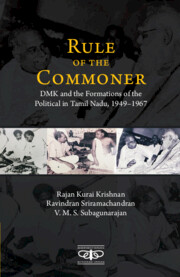8 - Power of Fiction
Published online by Cambridge University Press: 15 June 2022
Summary
Namakkal Ramalingam Pillai (1888–1972), a poet and anationalist, was arrested during the CivilDisobedience Movement in 1932 and was incarceratedin a B-class cell in Vellore where many frontlineCongress leaders were also jailed. Bulusu Sambamurtiof Andhra Pradesh was one of them. Sambamurti was awell-groomed person, genteel and energetic, who tooka liking to Ramalingam while the latter was alreadyan admirer of the former. One day, at the prayergathering in the evening, one person sangRamalingam's poems. Sambamurti was impressed withthe lyrics, which as a Telugu speaker he couldn'tunderstand and took help to comprehend fully, askingwhether the poems sung at the prayer were written bySubramanya Bharathi, the famous nationalist poet.People replied that they were written by Ramalingamwho was present there. Sambamurti was delightfullysurprised. After this incident, he starteddiscussing Ramalingam's poems and songs in theirprivate conversations, which were conducted mostlyin English as Sambamurti could somewhat understandTamil but could not speak the language, same asRamalingam who could not speak Telugu, though hecould understand it to some extent. Sambamurti'scell was located next to that of Ramalingam, whichperhaps allowed them to meet often. Ramalingamdescribes one significant conversation that led tohis writing a novel, Malaikkaḷḷaṉ (Thief of theMountains):
On one of the days when we had such conversationsSambamurti wanted to know what kinds of works Ihave written in Tamil. I mentioned a few. Theconversation turned to the need to write fictionin prose, short stories and novels. Sambamurtispoke of many English, French, Bengali and Marathiwriters; he then insisted that I too should writefiction in prose like a teacher would prevail upona disciple. As I had earlier toyed with the idea,after listening to Sambamurti, I felt a definiteimpulse that I try some writing in prose. Istarted writing Malaikkaḷḷaṉ the next day.
The context and tenor of the conversation in the prisonalmost makes it appear like writing a novel in proseis in public cause akin to the service of thenation. Much has been theorized about the intricatelink between nation and narration.
- Type
- Chapter
- Information
- Rule of the CommonerDMK and Formations of the Political in Tamil Nadu, 1949–1967, pp. 159 - 174Publisher: Cambridge University PressPrint publication year: 2022

